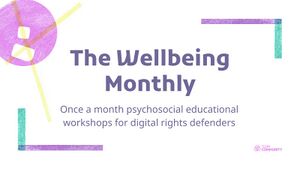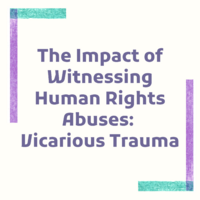The Impact of Witnessing Human Rights Abuses: Vicarious Trauma
This session is part of The Wellbeing Monthly 2023, a monthly virtual workshop will be led by diverse mental health professionals, and will focus on psychoeducation and coping mechanisms on diverse topics including anxiety and fear, guilt and survivors guilt, defeat and hopelessness, trauma, and burnout and stress.
- Who: Fahad Awan
- Date: Tuesday, June 20
- Time: 9am EDT / 1pm UTC (What time is it in my city?)
- Language: English
- Location: Zoom
👉🏽 RSVP: https://digitalrights.formstack.com/forms/wellbeingmonthly1
The Impact of Witnessing Human Rights Abuses: Vicarious Trauma
The workshop on vicarious trauma will be examining the emotional and psychological impact of witnessing human right abuses and strategies for recognition and response. Participants will learn:
- About vicarious trauma and how it can impact their lives as digital right defenders.
- A deeper understanding of compassion fatigue, secondary traumatic stress, and burnout.
- Practical tools for self-care, resilience-building, and establishing healthy boundaries.
Fahad Awan (he/they) is a Fulbright Scholar and a Mental Health Counselor who graduated from Teachers College, Columbia University. He works at the junction of Psychology, Education and Consulting, has worked on wellness programmes of over 250 schools in Pakistan and aims to restructure the landscape of mental health in developing countries, hoping to make it more inclusive, accessible and affordable. They operate from an Intersectional and feminist lens, specializing in issues surrounding gender, sexual orientation and identity.
Notes & Resources
Presentation
The Impact of Witnessing Human Rights Abuses Presentation
Resources
- https://www.identitydevelopmentinstitute.com/id-institute
- Interesting podcasts that can help us understand our cycles: https://www.bbc.co.uk/programmes/p0bvg9nm/episodes/downloads
Books:
- Vicarious Trauma Guidebook
- "Trauma Stewardship: An Everyday Guide to Caring for Self While Caring for Others" by Laura van Dernoot Lipsky and Connie Burk - This book focuses on the toll that trauma work can take on individuals and provides practical tools for managing the effects of vicarious trauma
- "The Reflective Practice Guide: An Interdisciplinary Approach to Critical Reflection" by Barbara Bassot. This book focuses on the importance of reflective practice for professionals in high-stress environments and offers tools and exercises to facilitate self-reflection
Articles:
- Organizational factors leading to vicarious trauma or burnout
- Vicarious traumatization, secondary traumatic stress, and burnout in sexual assault and domestic violence agency staff
Videos:
- Dr. Gabor Maté - Intro to Vicarious Trauma
- Where the word association game was from
- Office for Victims of Crime - Addressing Vicarious Trauma in Victim Service Professionals
- Office for Victims of Crime - Addressing Vicarious Trauma in First Responders
Podcasts:
Other Resources online:
- https://ovc.ojp.gov/program/vtt/compendium-resources
- https://www.trauma-pages.com/resources.php
- https://www.mindfitproject.com/resources#/stress-firstresponders
Q&A Notes
What if one can’t afford therapy in their society? Especially therapy that is queer-affirming?
Most therapy spaces are expensive or not affirming and it's a reality that we have to work on and be aware of. There are some organizations working to make therapy more accessible. Right now, they offer online services, which is not perfect, but it is a step.
Is there any relation between burnout and vicarious trauma?
Burnout is a general exhaustion that can be caused by various reasons. Vicarious trauma is more deep rooted, because what I am listening is too horrendous and it is hard for me to not get affected by it.
What is the most effective approach for discussing a self-diagnosis with your mental health professional/provider?
It depends on everyone but just discuss it as soon as you can. If you feel safe to share it, do it. Keep in mind that the therapist is on your side
Do you have any tips on initiating collective care at work?
This looks very different for different environments. We don't want to shift the burden of care but honest disclosures, small disclosures about how I been feeling in certain situations in a safe capacity and using that for turning it in a community process. Talking to the right people is difficult but it is key, observe their reactions to know what is the safest way to share your feelings.
How do you create boundaries between your personal issues/values with professional work all the while working from home?
What has worked for me is that acknowledging that there are things that will trickle down and find resources to compartmentalize and create spaces. It is smart to work on your boundaries: know what the boundary looks like and tolerating the discomfort that comes up with setting boundaries. It is a slow process.

